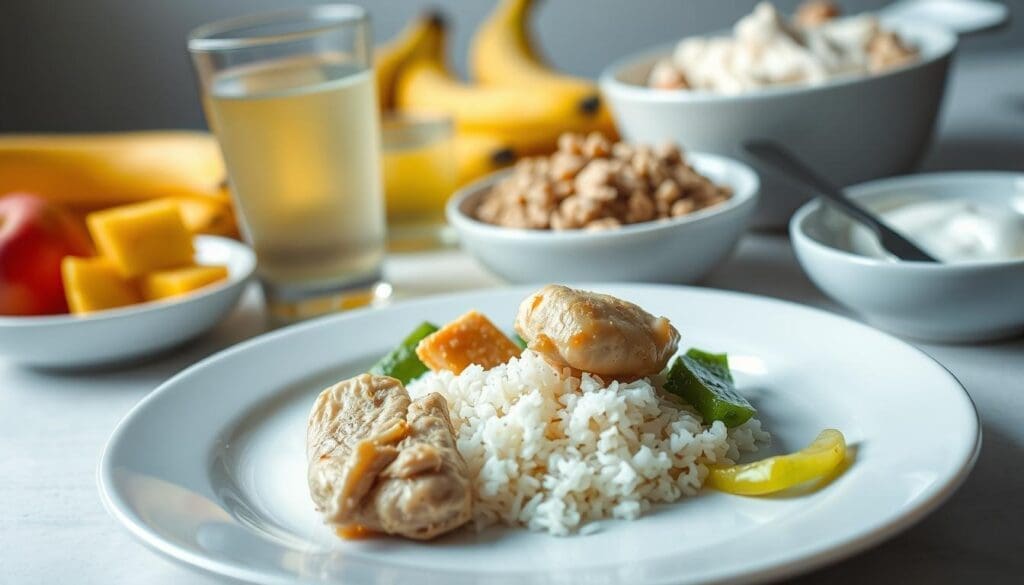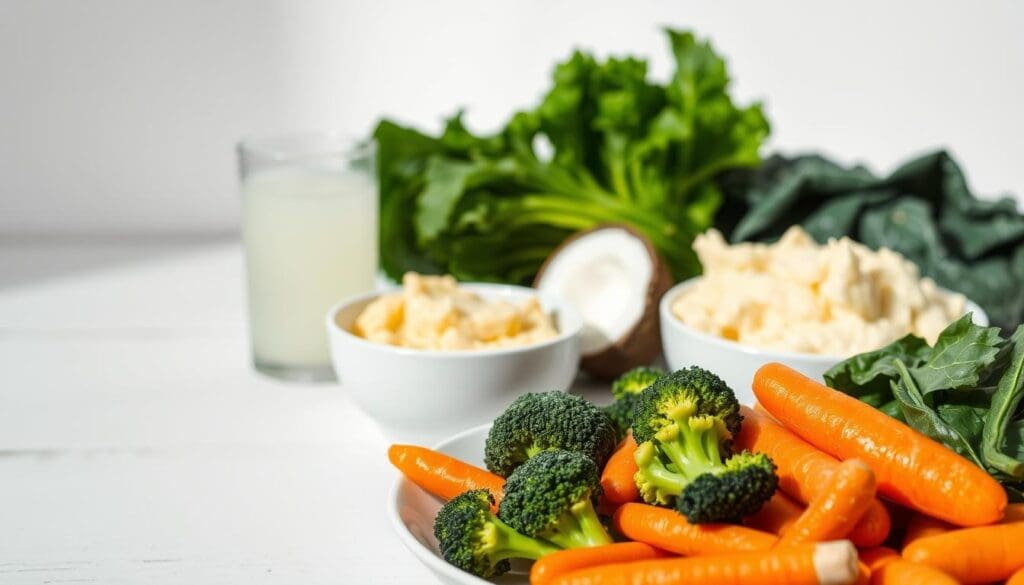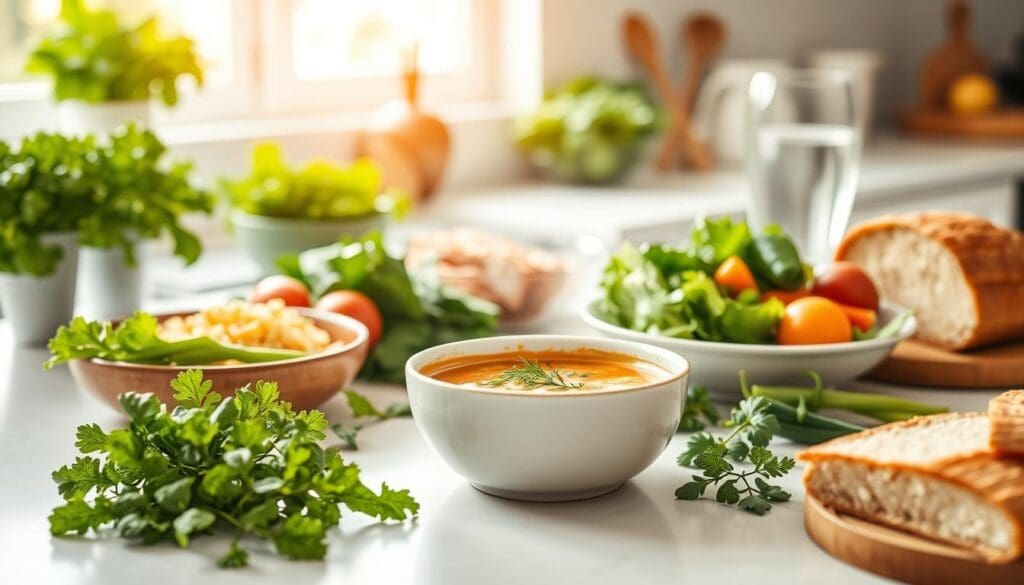Last Updated on November 26, 2025 by Bilal Hasdemir
Recovering from bowel resection surgery means paying close attention to what you eat. At Liv Hospital, we know how crucial a good diet is. It helps avoid complications and makes recovery smoother. Our experts will show you the best foods to eat, helping you deal with digestive issues and get back to eating normally.

Right foods are key to healing well. We’ll give you a detailed guide on the best foods to eat after bowel surgery. This will focus on your diet after bowel resection surgery and nutritional needs during recovery.
Nutrition is key to healing after bowel resection surgery. The right foods help the body heal and get strong again.
Bowel resection surgery removes part of the intestine. This can make digestion harder. The bowel needs time to adjust and heal.
Patients might have diarrhea or constipation. It’s important to eat foods that are easy to digest. Start with fluids and then move to solid foods to avoid discomfort.

The main goals are to give the body nutrients for healing, stay hydrated, and ease digestive issues. A well-planned diet helps recovery go smoother and faster.
| Nutritional Goal | Recommended Foods | Benefits |
| Hydration | Clear broths, electrolyte-rich beverages | Replenishes fluids, maintains electrolyte balance |
| Easy-to-Digest Nutrients | Plain toast, bananas, applesauce | Gentle on the digestive system, provides essential nutrients |
| Protein for Healing | Lean proteins like chicken, eggs | Supports tissue repair and healing |
By focusing on these goals and choosing the right foods, patients can help their body heal. This reduces the risk of complications after surgery.
Patients recovering from bowel resection surgery need a gradual diet plan. This plan helps the healing process, reduces discomfort, and improves bowel function. For a few weeks after surgery, sticking to a soft or light diet is recommended.
The diet plan has three phases, each suited to the patient’s recovery and digestive health. Knowing these phases is key for a smooth recovery.
The first phase focuses on clear liquids to ease digestion. This is crucial in the first few days after surgery. Clear liquids are easy to digest and prevent dehydration. Examples include:
It’s important to avoid caffeinated and carbonated drinks in this phase, as they can cause discomfort.
As the patient gets better, they can move to full liquids. These provide more calories and nutrients. This phase includes:
We recommend introducing these liquids slowly to see how well they are tolerated.
The final phase is about eating soft, low-fiber foods. These are gentle on the digestive system. Examples include:
It’s important to chew food well and eat slowly in this phase.
As patients move through these phases, they should listen to their body. If they experience discomfort or digestive issues, they should talk to a healthcare provider.
| Dietary Phase | Foods Included | Key Considerations |
| Phase 1: Clear Liquids | Water, clear broth, electrolyte-rich beverages, clear fruit juices, gelatin | Avoid caffeinated and carbonated drinks |
| Phase 2: Full Liquids | Milk, thinned soups, nutritional supplements, pureed fruits and vegetables | Introduce gradually to assess tolerance |
| Phase 3: Soft, Low-Fiber Foods | Mashed potatoes, soft-cooked eggs, pureed meats, soft fruits | Chew thoroughly and eat slowly |

Following this gradual dietary approach helps patients recover well. It minimizes complications and allows them to return to normal eating habits over time.
“The key to a successful recovery after bowel resection surgery lies in a gradual and well-planned dietary progression.”
A healthcare professional’s guidance is invaluable in this process.
Protein-rich foods are key for healing after bowel resection surgery. Our bodies need protein to fix tissues and keep muscles strong. Eating the right foods can help your body heal faster.
Greek yogurt is a great protein source that’s easy on your stomach. It also has probiotics, which help your gut health. Choose plain, unflavored Greek yogurt to avoid sugars.
Tender chicken is a good protein choice for after surgery. It’s lean and easy to digest, helping your body repair without discomfort. Boiled, baked, or steamed chicken is best for healing.
Scrambled eggs are a complete protein, with all essential amino acids. They’re also easy to digest if cooked right. Soft and fluffy eggs are best after surgery. Eggs are easy to add to many dishes, making them a great protein option.
To understand the benefits of these foods, here’s a comparison table:
| Food | Protein Content (per serving) | Additional Benefits |
| Greek Yogurt | 20 grams | Probiotics for gut health |
| Tender Chicken | 30 grams | Lean protein for muscle maintenance |
| Scrambled Eggs | 18 grams | Complete protein source |
Eating these protein-rich foods after bowel resection surgery can help a lot. Always talk to your doctor or a nutritionist to make sure your diet is right for you.
After bowel resection surgery, it’s key to eat foods that are easy to digest. These foods give the body the energy it needs to heal. They are gentle on the stomach, helping to manage symptoms and aid in recovery.
White rice is a top choice after bowel resection surgery. It’s simple and easy to digest. It gives quick energy without straining the stomach. Stick to plain white rice, avoiding spices or fats that can upset the stomach.
Mashed potatoes are comforting and nutritious. They’re rich in carbs and can be made more nutritious with broth or milk. But, avoid adding butter or fats that might cause discomfort.
White bread or toast is a low-fiber choice that’s easy to digest after surgery. It’s versatile and can be eaten plain or with a bit of low-fat spread. Toasting bread can help break down starches, making it easier to digest.
| Food | Nutritional Benefits | Preparation Tips |
| White Rice | Quick energy, easy to digest | Plain, without added spices or fats |
| Mashed Potatoes | Rich in carbohydrates, can be enriched with broth or milk | Avoid adding butter or other fats |
| White Bread or Toast | Low-fiber, versatile | Can be consumed plain or with low-fat spread |
Adding these easy-to-digest carbs to your diet after surgery can help a lot. They provide the energy needed for recovery and help manage digestive issues. Always talk to your healthcare provider for specific dietary advice.
After bowel resection surgery, soft fruits and veggies are great for your diet. They’re full of vitamins and minerals that help you heal and stay healthy. Adding them to your meals can help you recover faster.
Bananas are perfect after bowel surgery because they’re full of potassium and easy to digest. They help replace lost electrolytes. One medium banana has about 422 milligrams of potassium, making them a top choice for a quick snack.
Applesauce is soft and gentle on your stomach. It has fiber but no roughage, so it won’t upset your bowels. It’s also packed with vitamin C, which boosts your immune system and aids in healing.
Canned peaches are soft, easy to digest, and full of vitamins and minerals. They’re a great source of vitamin A and potassium. Canned fruits are easy to add to your diet while you’re recovering.
Steamed carrots are packed with nutrients and easy to digest after surgery. They’re a top source of beta-carotene, which turns into vitamin A in your body. Vitamin A is key for healthy mucous membranes and a strong immune system.
| Food | Nutritional Benefits | Why It’s Beneficial After Bowel Surgery |
| Bananas | High in potassium, binding properties | Replaces lost electrolytes, easy to digest |
| Applesauce | Fiber without roughage, vitamin C | Gentle on the digestive system, supports immune function |
| Canned Peaches | Rich in vitamin A and potassium | Soft, easy to digest, nutrient-dense |
| Steamed Carrots | High in beta-carotene (vitamin A) | Supports immune system, healthy mucous membranes |
Adding these soft fruits and veggies to your diet can really help you recover from bowel resection surgery. They’re full of vitamins, gentle on your stomach, and support your overall health.
Hydrating and soothing foods are key to healing after bowel surgery. They keep you hydrated, support your digestive system, and offer comfort. Here are some foods we suggest adding to your diet while you recover.
Bone broth is great for staying hydrated and getting nutrients after bowel surgery. It’s full of electrolytes and collagen, which soothe your digestive tract. Its warm, easy-to-digest nature provides comfort and helps replace lost fluids. You can drink it alone or mix it with other soups.
Gelatin is a soothing food that’s easy on your stomach. It’s a protein-rich food that helps firm up stool and reduce diarrhea. You can enjoy it as a snack or add it to other foods to boost their nutrition.
Smooth soups, like pureed vegetable soups, are comforting and full of nutrients. They’re easy to digest and help you stay hydrated. Choose soups that are low in fiber and not too spicy to avoid upsetting your stomach.
These foods offer many benefits:
Adding these foods to your diet can help your body heal and make recovery more comfortable. Always talk to your healthcare provider or a registered dietitian for specific dietary advice after bowel surgery.
Healthy fats are key for our health, especially after bowel surgery. They help us absorb vitamins, give us energy, and aid in healing.
Avocado is a top choice for healthy fats during recovery. It’s full of monounsaturated fats. These fats are gentle on your stomach and rich in nutrients.
Avocados are a great option for bowel surgery recovery. They’re soft and full of vitamins C and E, potassium, and fiber. This makes them a nutritious addition to your meals.
The fats in avocados help us absorb vitamins and give us lasting energy. This is crucial when you’re recovering. Plus, you can add avocados to many dishes, like mashed, sliced, or in smoothies.
Eating avocados after surgery helps you get the nutrients you need for healing. Their creamy texture is also gentle on your stomach. This makes them perfect for this sensitive time.
Making changes to your diet is key to managing digestive symptoms after bowel resection surgery. After surgery, many patients face digestive issues that slow down their recovery.
Diarrhea is a common problem after bowel resection surgery. Some foods can help manage it. Here are a few:
These foods are part of the BRAT diet, often recommended for diarrhea.
Gas and bloating are common symptoms after bowel resection surgery. To reduce them, try these dietary changes:
| Food | Effect on Gas and Bloating |
| Beans and Legumes | Can cause gas |
| Broccoli and Cauliflower | May increase bloating |
| Ginger | Can help reduce bloating |
While some digestive symptoms are normal after bowel resection surgery, certain signs mean you should contact your doctor:
If you have any of these symptoms, it’s important to get medical advice to avoid complications.
As you recover from bowel resection surgery, it’s important to know how to eat normally again. This is a slow process that needs patience and attention to your body’s signs.
Most people start eating normally again in 4 to 6 weeks after surgery. But, this time can change based on your surgery and health. It’s key to listen to your doctor about when to eat more solid foods.
Pay attention to your body and don’t rush. Start with small amounts and slowly eat more as your stomach gets used to it.
Some people might need to skip certain foods for a long time after surgery. These include:
Knowing and avoiding these foods helps keep your stomach healthy after surgery.
Talking to your doctor is the first step to know when you can drink alcohol again. Usually, you should wait until you’re eating normally and feeling better. Drinking alcohol can upset your stomach and should be done carefully, if at all.
Knowing how to eat normally again and listening to your body are important for a good recovery. Always do what your healthcare team advises.
A good diet is key after bowel resection surgery for a quick recovery. Nutrition helps the body heal and manage digestive issues.
Following a diet plan is important to meet nutritional needs. This includes eating protein, soft carbs, fruits, veggies, and healthy fats. Drinking plenty of water is also crucial.
We’ve shown how important nutrition is during recovery. We’ve also given tips on handling digestive problems. Following these diet tips helps the body heal and lowers the chance of complications.
Recovery needs proper nutrition, medical care, and patience. By focusing on nutrition and following a diet plan, people can recover better and stay healthy.
Start with clear liquids, then move to full liquids. Finally, eat soft, low-fiber foods. This helps your bowel function and reduces discomfort.
Eat protein-rich foods like Greek yogurt, tender chicken, and scrambled eggs. Choose easily digestible carbs like white rice, mashed potatoes, and white bread. Soft fruits and veggies, like bananas and steamed carrots, are also good.
It takes weeks to months to get back to normal eating. Gradually transition and avoid some foods for a long time.
Avoid alcohol for a while after surgery. The exact time depends on your situation. Always check with your doctor.
Stay away from high-fiber, spicy, or hard-to-digest foods. The specific foods to avoid depend on your tolerance and the surgeon’s advice.
Adjust your diet to control diarrhea, gas, and bloating. Include foods that help and stay hydrated. If symptoms don’t go away, talk to your doctor.
Avocado is a soft, nutrient-rich fat that’s easy on your stomach. It’s a great choice for recovery.
You can get back to normal eating, but follow a gradual diet plan. Avoid certain foods to prevent complications.
The diet after intestinal resection is similar to bowel resection. It starts with clear liquids and gradually adds more foods.
It takes several weeks to months to eat normally again after bowel surgery.
Eat foods that are easy on your stomach, like clear and full liquids, and soft foods. Include protein, carbs, and soft fruits and veggies.
Subscribe to our e-newsletter to stay informed about the latest innovations in the world of health and exclusive offers!